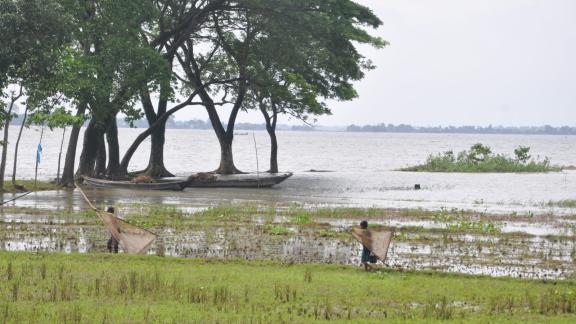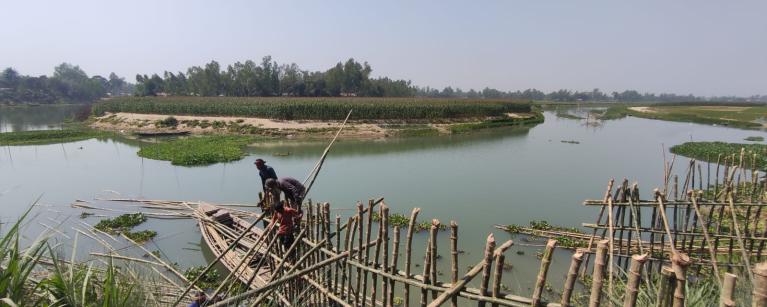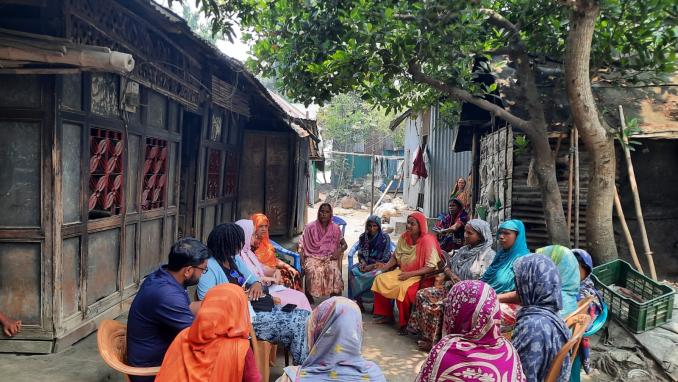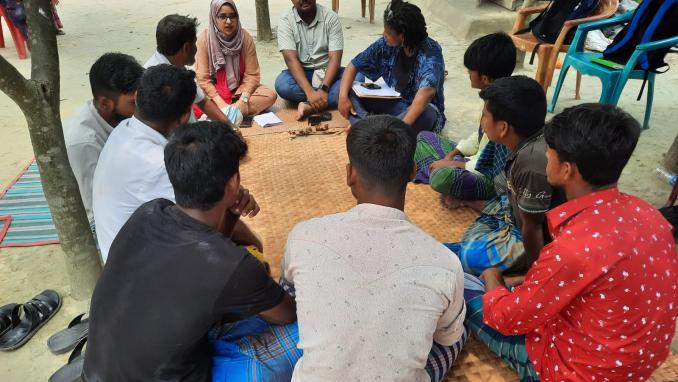This blog is written by Yasha Mannan, Programme Officer, Oxfam in Bangladesh, her work focuses on water cooperation, transboundary issues, social justice and inclusion. Special thanks to Sushmita Mandal, Ms Sushmita Mandal, Senior Research Fellow, SEI guidance and suggestions during the writing process.
When a flash flood struck eastern region of Bangladesh in August 2024, areas with little history of such flooding, people were caught off guard. Rumors around what caused it spread faster than rescue efforts. While many blamed upstream causes, the deeper issue was clear: a failure of infrastructure, communication, and evidence-based governance. This is where science-based tools and cross-border data sharing become critical. The urgency was palpable during the floods, but this is not a new story.
While Bangladesh’s experience with flood reveals the gaps, other regions offer models of how science-based cooperation can work. There are models to learn from, for instance, the Danube River Commission demonstrate how real-time data sharing and early warning systems strengthen flood preparedness across borders.
What Gets Seen Gets Saved - A Powerful Observation from the Field
As one academician from Sylhet Agricultural University shared, “We rush to save crops during floods. But what about the fish? During disasters fish habitats are lost too but since they’re underwater, they don’t make headlines”. This highlights a critical gap, what’s visible gets prioritized, leaving aquatic ecosystems and their dependent communities overlooked. Making science people-centered, translating data into stories that communities can relate to is key to inclusive, sustainable water governance.
“Turning science into stories people can relate to, that’s the real challenge,” said Dr. Md. Anowarul Islam, Associate Professor & Head, SUST. Scientific research must not stay confined to labs or reports, it must reach those it affects most.
Building Policies on Scientific Evidence: Insights from the Rivers, Rights, and Resilience Forum (RRRF)
The Rivers, Rights, and Resilience Forum, under the TROSA2 Project is an annual event uniting water professionals across sectors to promote equitable water governance. A key debate at the forum explored whether science-based policymaking enhances water cooperation, some saw it as essential for fairness, while others warned it can be harmful if not grounded in local context.
For the proposition, Mr. Abu Touhid, Junior Program Officer, GCA and Dr. Vishal Singh, Executive Director, CEDAR stressed the importance of integrating data, models, and risk analysis, particularly for transboundary rivers. They warned that emotion-driven or politically motivated policies often lead to unjust or ineffective outcomes. The role of media in shaping public perception was also highlighted.
Against the proposition, Ms Priyanka Pandey, Youth Basin Ambassador, TROSA I and Mr. Raju Narzary, Executive Director, NERSWN argued that that while science is valuable, its application must be rooted in local knowledge, ethics, and social realities. Both shared concerned against technocratic approaches that ignore cultural contexts and risk reinforcing inequality and environmental harm. Scientific evidence must be grounded in local knowledge and social realities to be effective.
“Cherry-picking data to support specific agendas can do more harm than good,” Ms. Priyanka cautioned.
Her argument highlighted the importance of integrating indigenous knowledge and cultural awareness into scientific frameworks. “While the Indus Waters Treaty is a rare example of science aligning with political and historical realities, cases like the hydropower project in Arunachal Pradesh show how environmental concerns are often ignored and public interest sidelined. It’s a reminder that science must serve people, not just power” said Mr. Raju Narzary.
What Can We Do Differently?
- Making Science Understandable and Accessible: The Role of Communication and Institutions
Three key points were emphasized by Mr Jyotiraj Patra, Regional Representative Asia, Simavi regarding the role of science in policymaking. First, translation and synthesis of scientific evidence, scientific data must be shared in simple, accessible language and made publicly available to inform decisions. Using both digital and traditional media helps ensure research reaches and resonates with the wider public. Second, building Trust Between the Scientific Community and Policymakers as Miscommunication or misrepresentation of scientific findings can erode trust. Accurate, transparent dialogue is essential to bridge this gap. Third, transformation of institutional practices, such as adapting institutional frameworks to better integrate scientific input into policy requires systemic changes. Institutional reforms will include institutionalizing public engagement in science policy, improving data infrastructure and accessibility, embedding science liaisons within government agencies as well as active grassroots engagement.
“True cooperation isn’t about choosing between science and politics but recognizing the value of both," he concluded.
- Citizen Science-A Pathway to Inclusive Governance from Mahakali to Ganges-Brahmaputra-Meghna
In Mahakali Basin of Nepal women from the Women Empowerment Centre actively monitor water quality, transforming local knowledge into scientific data and ensuring that marginalized voices, especially those of women, are represented in decision-making processes.
In Bangladesh “Nodi Boithok” translated to “River Meeting” serve as a platform to gather data and validate important findings.
It offers a vital platform for riverine communities in Bangladesh to share their daily experiences with the river, the impacts of river governance, and the challenges they encounter. This space helps ensure that complex information is grounded in and validated by the lived realities of those most affected.
Another compelling example of science, indigenous knowledge collaboration is the construction of Bandals, riverbank structures co-designed using local wisdom and scientific expertise to reduce erosion. This collaboration of local knowledge and scientific expertise come together to build more resilient structures, ultimately strengthening the community’s overall resilience from riverbank erosion.
- Cooperation Beyond Consensus: Centering Communities in Science and Policy
Science plays a crucial role in assessing risks and identifying common drivers of water-related challenges, but trust-building and cooperation are ultimately human and political processes. Senior Research Fellow Sushmita Mandal from SEI rightly said that cooperation is not either-or; it is collective.
In the real world, science can be useful in assessing risk and identifying common drivers of problems. This knowledge can help build a shared understanding, which is the foundation of trust and cooperation. But making cooperation work is ultimately a human and political process that must include the voices of local communities, often marginalized in decision-making yet at the forefront of addressing these challenges.
Bangladesh’s remarkable success in cyclone management, reducing deaths from hundreds of thousands of people in 1970 to single digits today, it is a powerful testament on how science-based policies and community preparedness save lives (The Daily Star, 2022). Science alone is not enough but when paired with local knowledge, inclusive platforms, and political will, it becomes a powerful tool for justice and resilience. We must bring science to communities and let community wisdom shape science in return.

Captured by Israt Jahan Ema at Tanguar Haor


